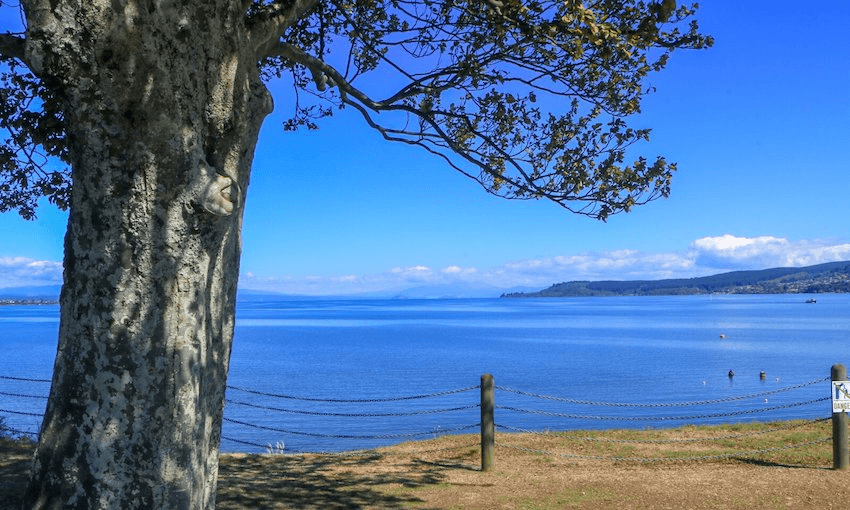Ngāti Tūwharetoa has just become the first iwi to be approved under the Resource Management Act to take over certain council duties. Here’s why that matters.
In 1991, the Resource Management Act (RMA) allowed councils to transfer any of their functions to local iwi. Now, almost 30 years after that act was passed, the first example of this transfer has now occurred between the Waikato Regional Council and Ngāti Tūwharetoa.
After two years of planning, the Tūwharetoa Māori Trust Board last week was granted the responsibility of monitoring water quality around Lake Taupō. CEO Shane Heremaia says it’s a small step in the right direction towards greater shared power between local government and iwi.
“This is an important step in realising that relationship and hopefully it means that going forward there will be further opportunities to receive even greater benefits for Ngāti Tūwharetoa and for everyone in this region.”
The first use of Section 33 has been a long time coming, and now that the Waikato Regional Council has supported Section 33, Heremaia hopes other councils will start to give iwi these opportunities too.
“I think certainly there has always been a lot of will on the part of iwi to be more involved in affairs that are affecting us and our environment,” he says. “Iwi around the country in the last 30 years have been very keen to see this sort of work happening.”
Neville Williams, community services director at the Waikato Regional Council, says the 30 year delay can at least partly be blamed on the transfer process, which he admits is very complicated.
“Many iwi are just so busy trying to address the multitude of issues that are on the table right now and build their capabilities for urgent, emergency issues, let alone having the capacity to undertake the planning and the implementation of something as complex as a Section 33 transfer.”
Under the transfer, the Tūwharetoa Māori Trust Board will be taking responsibilities from September, including testing popular swimming beaches in the summer, monthly testing of rivers flowing into Lake Taupō and biannual groundwater monitoring at two local schools.
When the council opened public submissions on the transfer, Heremaia was prepared for the inevitable negativity. While he says there were a number of “discriminatory” comments, the amount of support was overwhelming.
“Not only in Tūwharetoa, but from outside, all around the country from a wide cross-section of society. So that shows there is a lot of goodwill to see councils devolving some of these functions to iwi and working together more effectively.”
Williams says the process to weed out the valid public concerns from those more hatefully motivated was strict. But the process does highlight a concerning section of New Zealand society that seems committed to stifling Māori leadership.
“I’ve always recognised that underbelly is quite strong in our culture, unfortunately, and I think anything that looks like Māori might be getting something that people think they might not be entitled to, they get quite vocal about it.”
In this case, the council’s responsibility was to ensure that Ngāti Tūwharetoa had the capabilities and training to carry out the job required, and Williams says there were a lot of belts and braces wrapped around the process to ensure this was the case.
The council will still be funding the costs associated with the transferred water quality monitoring functions, and administer training for the processes involved in the testing. For Williams, this is a step towards a relationship between iwi and council that goes further than just the statutory requirements.
“Now when we consider all of those discretionary opportunities we can move into a space of trust based on success and mutually beneficial opportunities. We can move into a space that’s quite exciting, that’s within scope of our control and that complements the aspirations of Tūwharetoa and all the people who have a relationship with their area of interest,” says Williams.
Already, councils from other parts of the country have been in touch to organise meetings with Williams and discuss their own opportunities within Section 33. It’s encouraging, he says, to be leading the change towards better partnerships with mutually beneficial outcomes for all New Zealanders.
“I hope that other iwi and councils genuinely consider the opportunity and I’m hopeful that we are successful in what we’re endeavouring here and that New Zealanders as a whole see this as a natural way of doing business.”
Heremaia thinks the transfer makes sense for Ngāti Tūwharetoa, presenting an opportunity to expand the knowledge it has of its own waters as well as strengthening its council relationships.
“We’re here and we have the ability. We’ve been living here for a very long time and Ngāti Tūwharetoa is very connected to our waterways. While it’s quite a small step – it’s just collecting water samples and sending them off – it is an acknowledgement also that there are some functions of the council that may well be more appropriately situated within the iwi and when that’s the case, it should happen.”

